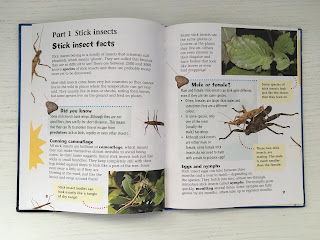There are some animals that get staring parts in fiction books
over and over again and then there are some that you’d be hard pushed to find
even making a guest appearance let alone a whole book dedicated to them. So it is a delight when you do find a book
which shines a light on an under represented creature, and in this case, as you
can tell by the title, it is Stick Insects that get the spotlight!
Chris Naylor-Ballesteros’s picture book ‘I love You Stick
Insect’ is an endearing read, full of humour and is beautifully illustrated with
equally charming images. The story is
one long declaration of love from one stick insect to another, as it proposes a
romance full of adventures and fun, whilst a sceptical butterfly looks on. And
although a romance does not blossom in this particular case, the Stick Insect
is a true romantic and his aspiration remains steadfast as he turns his affection
elsewhere.
Being a mother of a child who has a passion for natural
history and animal husbandry and living in a home with an ever growing menagerie,
I obviously share the house with a colony of Stick Insects, Sunny Stick Insects
to precise, I was delighted to find ‘I love you Stick Insect’ on the shelves of
my favourite independent bookshop. Also, I imminently saw the potential to use
it as the basis of a story sack which could be in turn used as a teaching resource
in classrooms too. So here is our ‘I Love You Stick Insect Story
Sack.’
But first let just have recap of what is included in a
typical Story Sack…
- A good quality
fiction book, (picture book or novel)
- A non-fiction book
related to the story and themes in the chosen picture book.
- Toys, (ideally a
soft toy for younger children).
- A game or activity
also related to the theme of the chosen fiction book.
- Optional worksheet
based on the story and themes off the story sack.
Our 'I Love You Stick Insect' Story Sack...
Books…
For books we have paired ‘I Love you Stick Insect’ with ‘Keeping
Unusual Pets Stick Insects and Mantids’ by June McNicholas, this is a children’s
guide to both the entomology and husbandry of keeping both Stick Insects and
Mantis, full of full colour photos and interesting facts.
Toys…
So, I have found that not only are stick insects sadly unrepresented in books, they are also scarcely available as toys. However there is one exception, you can purchase from either EBay, or the large online retailer who shall not be named, a toy model of an Australian Lord Howe Island Stick Insect (this is a very interesting variety that literally came back from extinction, which is well worth looking up!) The toy is by Science and Nature and is model number 75348.
Game or Activity…
As for a game or activity I have two, one is a model stick
insect which can be simply made, by using you’ve guested it a STICK! Plus pipe-cleaners
and with sticker for eyes or googly eyes. If you want to do antennas then you
can also use ‘Twisty Sticks’ which are wax covered string. All items are easily
available at a hobby/craft shops. It is
pretty easy and self-explanatory, each stick insect will take (if you aim for a
6-8 inch insect) 1 and half standard pipe-cleaners and half a Twisty Stick.
The second activity is well Stick Insect keeping. They are
really easy and inexpensive to keep, as they live on brambles. You can either
purchase a kit, which will come with a pop-up mesh enclosure water bottle and a
voucher to order your stick insects, (available online at aforementioned sites
from £12). Or alternatively if you have an exotic pet shop by you, you could
just buy some stick insect which (species depending) are usually only a couple
of £ each (just check with the shop owner about the suitability of the stick
insect variety for keeping with children). You can keep them in an old fish
tank, just put a netting cover over so they get lots of air flow, mosquito netting,
fruit netting or tutu netting would suffice. You feed them on brambles, which you
can place in a jam-jar, or even better, a children’s no-spill painting water
pot. Then sit and watch them munch, shed, grow, and maybe reproduce!












ReplyDeleteNice Post. Really it will help lot of people...
top 10 hotel management companies
revenue management consulting
I really thank you for the valuable info on this great subject and look forward to more great posts. Thanks a lot for enjoying this beauty article with me. I am appreciating it very much! Looking forward to another great article. Good luck to the author! All the best! notrac blox
ReplyDeleteGreat article Lot's of information to Read...Great Man Keep Posting and update to People..Thanks trappola cimici
ReplyDeleteSpace on the bookshelf often reflects untapped potential much like blank spaces on apparel waiting for creative designs with
ReplyDelete3D embroidery digitizing for caps you can transform ordinary items into standout pieces adding depth and personality just as a well-chosen book can bring a shelf to life.